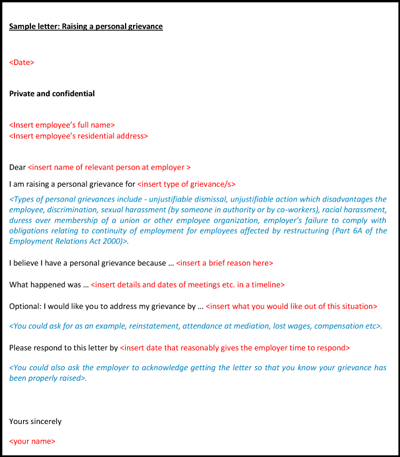
Personal Grievance Dispute Handling
– Wellington
Dismissals, bullying, claims and advice. Call for a free 15 minute phone consultation.
What is a personal grievance?
In a nutshell, a personal grievance is a legal process to hopefully fix up things that can go wrong for you at work.
The Employment New Zealand Government website define it as:
“A type of complaint that an employee may bring against a current or former employer.”
Examples of a personal grievance include:
- bullying (being bullied),
- fired / let go,
- unfair dismissal,
- overloaded with work,
- put in unsafe situations,
- given unfair warnings,
put through a discipline process, - discriminated against,
constructive dismissal (put in a situation where you have little option but to resign).

Learn more about examples of personal grievances here, and if you find yourself in situations like this, then Jamieson Partners can help.
A typical personal grievance process:
1) Attempt to resolve the issue directly with your employer
Sometimes, going back to your boss and telling them you have taken advice may fix the issue at no cost to yourself. If this doesn’t happen and you engage Jamieson Partners, we will likely raise the matter with your employer and seek a meeting to sort things out.
2) Engaging with an employment law expert or service
If things can’t be sorted, the government provides a free mediation service, however it is often better to use a specialist (such as Jamieson Partners), to guide you through this process to a successful outcome.
3) Discussing the grievance to determine an ideal outcome for you
This involves meeting with you, setting out the issues in a formal letter, and determining what you want done about it.
For example, if you are being bullied by a manager or co-worker, we would seek to move you away from the bully, seek compensation for the grief or stress you have been put through, and/ or seek reinstatement into your job. The grievance must be raised with the employer within 90 days.
Note: Workers on a 90 day trial period
If you are a new worker under a 3 month trial period, you probably won’t be able to use the personal grievance procedure unless it’s a human rights type issue. For further information on this, please read more here.
4) Next steps if mediation fails
Should mediation not settle the matter, you have the option of taking the grievance through to the Employment Relations Authority, or as a last resort the Employment Court. Here again, a better outcome is more likely if represented by an employment law expert.
It’s well to keep in mind that taking this step can lead to publicity – which can jeopardise career opportunities. Mediation, on the other hand, is private and confidential and most grievances are sorted in this way.
Free 15-minute phone consultation
To discuss the personal grievance process or any grievance related questions you may have, simply call or complete the contact form to arrange a free 15-minute phone consultation.
What’s the timeline? How long does a personal grievance take?
There is no set timeline for a personal grievance, and depending on individual circumstances and the grievance issues involved, it can take anywhere from days to months.
Template: Personal grievance sample letter
The Employment New Zealand website offers a free personal grievance template letter to help you formally raise a grievance with your employer, which we’ve included below:
Jamieson Partners is here to help. Call for a free 15 minute phone consult.
Jamieson Partners fees are modest, as set out under the fees page. It’s not unusual for grievances to be settled with the employer taking care of most costs.
On the other hand, if you are an employer and have trouble with an employee, or perhaps a personal grievance has been taken out against your business, Jamieson Partners can help here too. We have vast experience representing both employer and employee clients.
This gives us an edge over most legal firms and is significantly less expensive.

